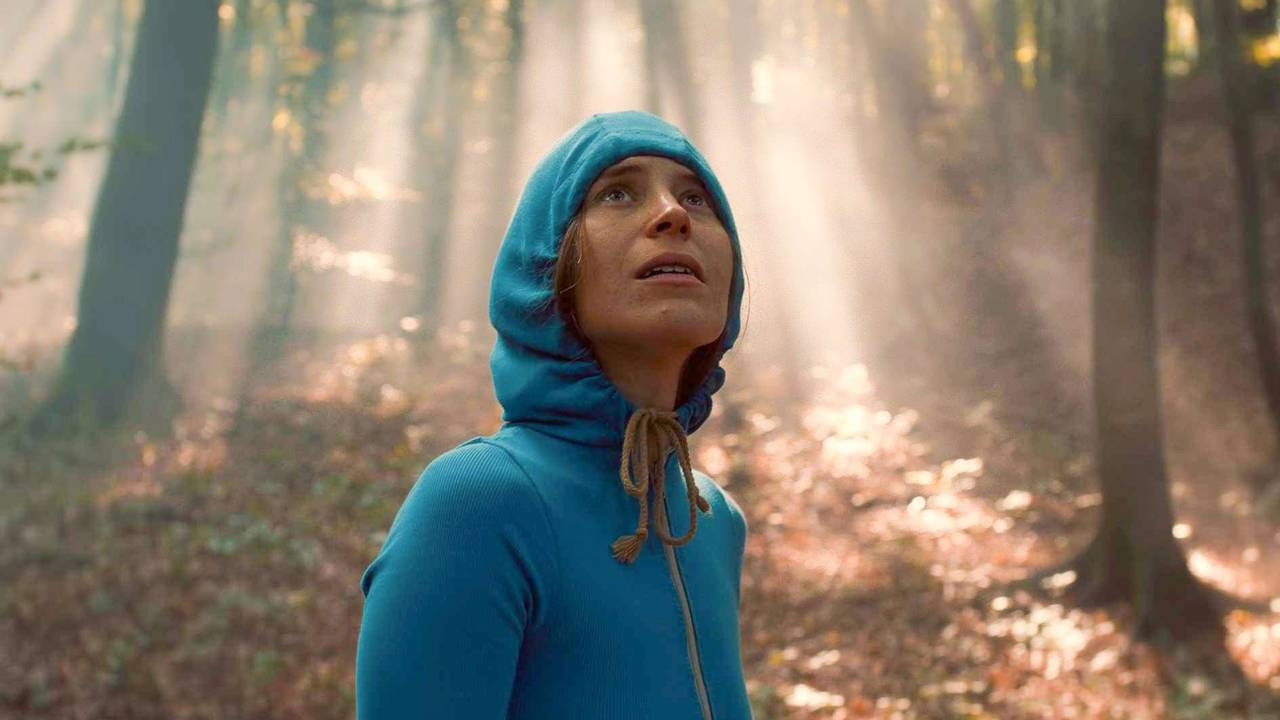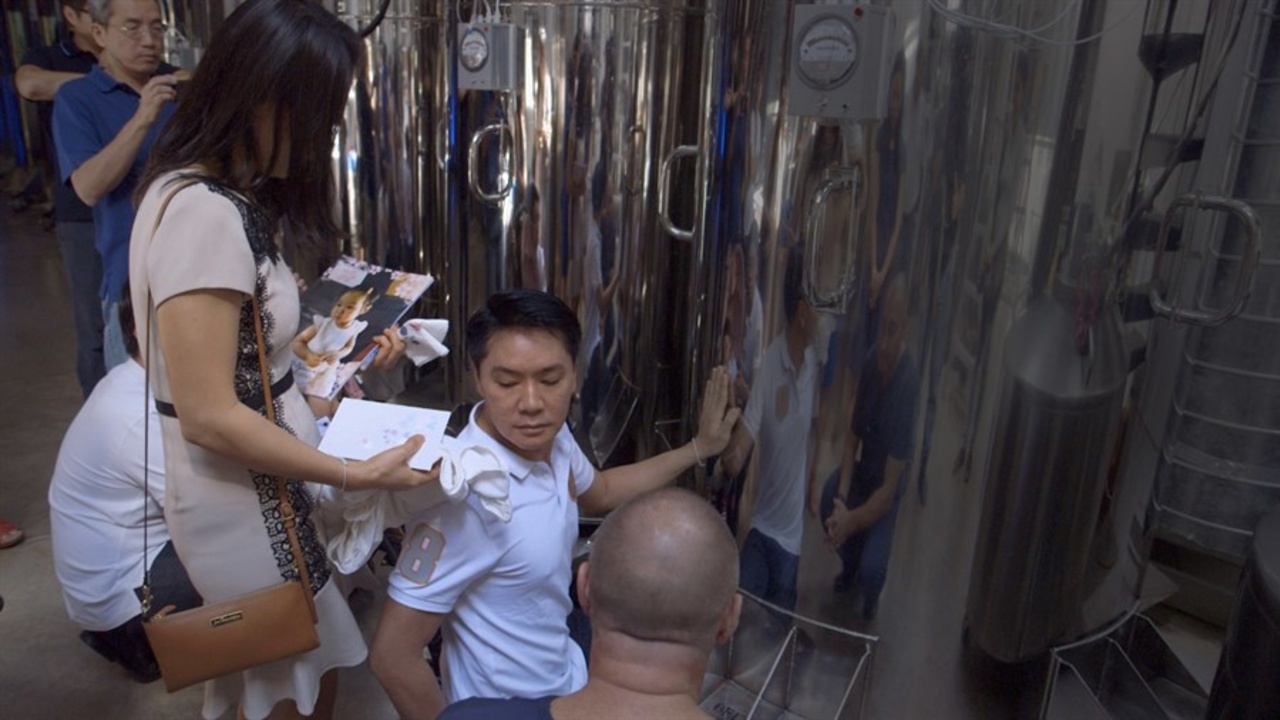These reviews of films playing at the London Film Festival are from viewings on the digital press library. The festival runs from October 2nd-13th. You'll find links to tickets for these films at the end of this post. At time of writing, tickets are available for all screenings of both films.
Love Me Tender
Dir: Klaudia Reynicke
The second fiction feature by Swiss director Klaudia Reynicke, Love Me Tender is a strange and changeable beast.
At the outset, this seems a largely serious minded look at a young woman named Seconda (Barbara Giordano) and her struggle with agoraphobia. We don’t know why she stopped going outside, but when we initially meet her she hasn’t left the apartment in nine months. When her mother dies and her father abruptly leaves, Seconda is trapped. With only answerphone messages from an increasingly abusive debt collector for company, she begins to think about ending her life. This is the unlikely cue for the film to begin to slip ever further into absurdist comedy.
Though it is about its main character’s psychology, Love Me Tender communicates largely through physicality. Barbara Giordano’s performance is striking from the very start, as we see her manically dancing in the living room she shares with her parents. This is one of several behaviours that seem to have been carved out as a way to find comfort. For the first half there is a somewhat greater degree of comfort to Giordano’s performance, as the character and the film are confined to the flat, it’s when we finally see Seconda pull on her ‘armour’— a blue onesie—and venture outside that we see the character at her most vulnerable and the performance at its most extreme. Outside, Seconda seems to shrink; a slender woman anyway, she seems to pull every part of herself inwards to take up as little space as possible and walks in a fast straight line, never engaging with the world around her unless it directly intrudes. It’s a funny visual, but also a great evocation of somebody profoundly uncomfortable in their surroundings, which is a line Giordano’s performance walks brilliantly throughout.
A few more people are drawn into the narrative in the film’s second half. The debt collector shows up at Seconda’s door and there is an instant and very funny twist in that relationship. Then there is Santo (Antonio Bannò), who knocks at the door asking if there are any bottles he can take to sell. This is the first person Seconda has engaged with in the weeks since her dad left, and she immediately draws him in and asks if he’ll kill her (“unfortunately I have a strong survival instinct”). The film sometimes veers quite quickly in tone, from a sequence that threatens to recall Lucky McKee’s May, to a late moment in which every character in the film appears in the apartment, dressed in Seconda’s blue onesie, which is straight out of Being John Malkovich. It’s a bit messy at times, but the shifts are unexpected enough to be amusing and they do all contribute to the larger picture of Seconda as a character.
You can probably watch Love Me Tender as a character study of a woman trying to get over her childhood trauma or as an absurd, drily witty, black comedy. For me, the combination of its two sides worked well, largely thanks to the deft work of Barbara Giordano; rooted in the character’s psychology but unafraid of being big and even occasionally silly. It’s an odd film and the peculiarly shifting tone won’t be for everyone, but if you go with it there are many rewards to be had.
★★★½
Hope Frozen
Dir: Pailin Wedel
We all want the best for our children. We imagine who they’ll be, what their lives will be like, what they’ll achieve. Sometimes we don’t get those answers at all because they are cruelly snatched away from us. For the family in Hope Frozen, that happened with their two-year-old daughter Einz, when she died of an especially virulent form of brain cancer. Scientists, they decided to cryopreserve her brain, in the hopes that in the future she would be able to be brought back and to have the life that was taken from her this time.
There’s not much that is formally notable about Hope Frozen. It’s a fairly standard issue documentary construction, with observed moments combined with talking heads to tell the story and the fact it runs just 73 minutes is another thing that would make it ideally suited, eventually, for the small screen. That said, the film loses little by this, indeed its impact may be heightened by the fact that the filmmaking is fairly simple as, by this choice, director Pailin Wedel places the focus squarely on the story and on the family going through it, allowing us a window into their grief and the way they are trying to use science to help them work through it and find a glimmer of hope.
There is an added wrinkle in that the family are Thai and Buddhist. Reincarnation is a central tenet of their religion and the film hints at some controversy around that in Thailand, with commentators asking if Einz, rather than being preserved to potentially be saved, is trapped; her soul unable to enter a new body. As with the other questions in the film, Einz’ father, mother and brother find beautiful words to explain their decision, saying that their loved one’s soul is still around, in everything and everyone she touched.
Religion plays a part, but the film, like the family, is largely rooted in science. Einz’ older brother Matrix is pursuing studies that will allow him to work on finding some way to bring his sister back, something he initially feels might be close, but both he and the film are brought down to Earth with a bump at a certain point. It’s only in this moment that his father’s hope seems to move into a sort of strident faith, though the film never draws a connection to religion.
It’s impossible not to be moved by Hope Frozen. You can’t help but feel the raw heartbreak of this family, or be roused by their moments of joy (especially one that forms the coda of the film), but it’s also clear that their hope seems distant, dim, and perhaps destined to remain in stasis.
★★★½






0 Yorumlar